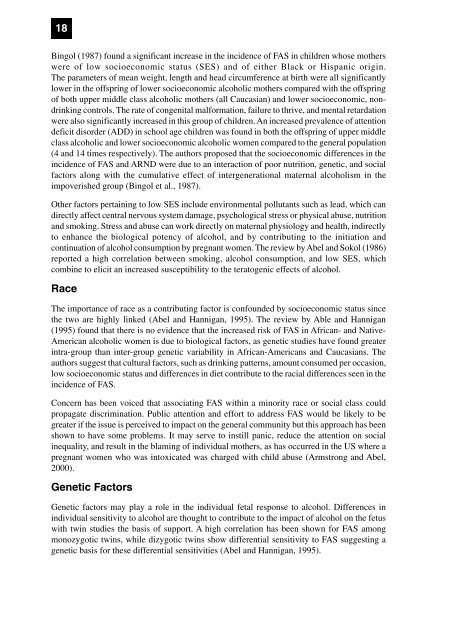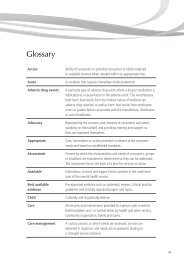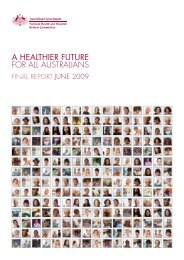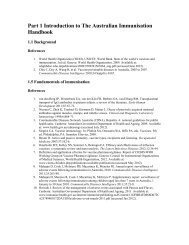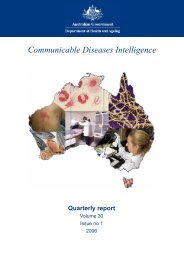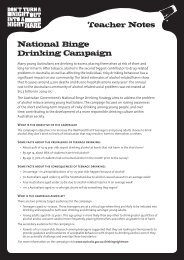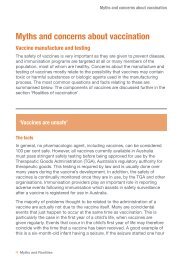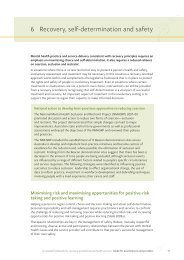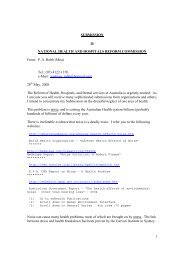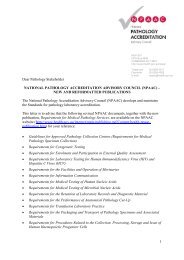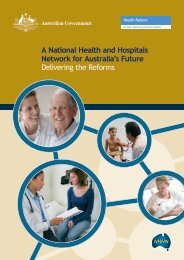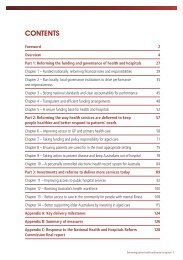Fetal Alcohol Syndrome A literature review - Department of Health ...
Fetal Alcohol Syndrome A literature review - Department of Health ...
Fetal Alcohol Syndrome A literature review - Department of Health ...
Create successful ePaper yourself
Turn your PDF publications into a flip-book with our unique Google optimized e-Paper software.
18<br />
Bingol (1987) found a significant increase in the incidence <strong>of</strong> FAS in children whose mothers<br />
were <strong>of</strong> low socioeconomic status (SES) and <strong>of</strong> either Black or Hispanic origin.<br />
The parameters <strong>of</strong> mean weight, length and head circumference at birth were all significantly<br />
lower in the <strong>of</strong>fspring <strong>of</strong> lower socioeconomic alcoholic mothers compared with the <strong>of</strong>fspring<br />
<strong>of</strong> both upper middle class alcoholic mothers (all Caucasian) and lower socioeconomic, nondrinking<br />
controls. The rate <strong>of</strong> congenital malformation, failure to thrive, and mental retardation<br />
were also significantly increased in this group <strong>of</strong> children. An increased prevalence <strong>of</strong> attention<br />
deficit disorder (ADD) in school age children was found in both the <strong>of</strong>fspring <strong>of</strong> upper middle<br />
class alcoholic and lower socioeconomic alcoholic women compared to the general population<br />
(4 and 14 times respectively). The authors proposed that the socioeconomic differences in the<br />
incidence <strong>of</strong> FAS and ARND were due to an interaction <strong>of</strong> poor nutrition, genetic, and social<br />
factors along with the cumulative effect <strong>of</strong> intergenerational maternal alcoholism in the<br />
impoverished group (Bingol et al., 1987).<br />
Other factors pertaining to low SES include environmental pollutants such as lead, which can<br />
directly affect central nervous system damage, psychological stress or physical abuse, nutrition<br />
and smoking. Stress and abuse can work directly on maternal physiology and health, indirectly<br />
to enhance the biological potency <strong>of</strong> alcohol, and by contributing to the initiation and<br />
continuation <strong>of</strong> alcohol consumption by pregnant women. The <strong>review</strong> by Abel and Sokol (1986)<br />
reported a high correlation between smoking, alcohol consumption, and low SES, which<br />
combine to elicit an increased susceptibility to the teratogenic effects <strong>of</strong> alcohol.<br />
Race<br />
The importance <strong>of</strong> race as a contributing factor is confounded by socioeconomic status since<br />
the two are highly linked (Abel and Hannigan, 1995). The <strong>review</strong> by Able and Hannigan<br />
(1995) found that there is no evidence that the increased risk <strong>of</strong> FAS in African- and Native-<br />
American alcoholic women is due to biological factors, as genetic studies have found greater<br />
intra-group than inter-group genetic variability in African-Americans and Caucasians. The<br />
authors suggest that cultural factors, such as drinking patterns, amount consumed per occasion,<br />
low socioeconomic status and differences in diet contribute to the racial differences seen in the<br />
incidence <strong>of</strong> FAS.<br />
Concern has been voiced that associating FAS within a minority race or social class could<br />
propagate discrimination. Public attention and effort to address FAS would be likely to be<br />
greater if the issue is perceived to impact on the general community but this approach has been<br />
shown to have some problems. It may serve to instill panic, reduce the attention on social<br />
inequality, and result in the blaming <strong>of</strong> individual mothers, as has occurred in the US where a<br />
pregnant women who was intoxicated was charged with child abuse (Armstrong and Abel,<br />
2000).<br />
Genetic Factors<br />
Genetic factors may play a role in the individual fetal response to alcohol. Differences in<br />
individual sensitivity to alcohol are thought to contribute to the impact <strong>of</strong> alcohol on the fetus<br />
with twin studies the basis <strong>of</strong> support. A high correlation has been shown for FAS among<br />
monozygotic twins, while dizygotic twins show differential sensitivity to FAS suggesting a<br />
genetic basis for these differential sensitivities (Abel and Hannigan, 1995).


